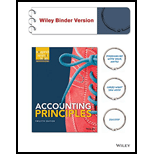
Journal entries: Entries to record the financial transactions during each accounting period are called journal entries. Income, liabilities and the giver are credited if the balance is increased and debited if the balance is reduced Expenses, assets and the receiver are debited if the balance is increased and credited if the balance is reduced in a
Sales tax: The additional amount paid by the buyer over and above the cost of goods plus profit margin of the manufacturer is known as sales tax. Company records this tax as the sales tax payable because it needs to be paid to tax authorities.
To prepare: The journal entries to record the sales transactions and sales taxes.
Want to see the full answer?
Check out a sample textbook solution
Chapter 11 Solutions
Accounting Principles 12E WileyPLUS with Loose-Leaf Print Companion with WileyPLUS Leanring Space Card Set

 AccountingAccountingISBN:9781337272094Author:WARREN, Carl S., Reeve, James M., Duchac, Jonathan E.Publisher:Cengage Learning,
AccountingAccountingISBN:9781337272094Author:WARREN, Carl S., Reeve, James M., Duchac, Jonathan E.Publisher:Cengage Learning, Accounting Information SystemsAccountingISBN:9781337619202Author:Hall, James A.Publisher:Cengage Learning,
Accounting Information SystemsAccountingISBN:9781337619202Author:Hall, James A.Publisher:Cengage Learning, Horngren's Cost Accounting: A Managerial Emphasis...AccountingISBN:9780134475585Author:Srikant M. Datar, Madhav V. RajanPublisher:PEARSON
Horngren's Cost Accounting: A Managerial Emphasis...AccountingISBN:9780134475585Author:Srikant M. Datar, Madhav V. RajanPublisher:PEARSON Intermediate AccountingAccountingISBN:9781259722660Author:J. David Spiceland, Mark W. Nelson, Wayne M ThomasPublisher:McGraw-Hill Education
Intermediate AccountingAccountingISBN:9781259722660Author:J. David Spiceland, Mark W. Nelson, Wayne M ThomasPublisher:McGraw-Hill Education Financial and Managerial AccountingAccountingISBN:9781259726705Author:John J Wild, Ken W. Shaw, Barbara Chiappetta Fundamental Accounting PrinciplesPublisher:McGraw-Hill Education
Financial and Managerial AccountingAccountingISBN:9781259726705Author:John J Wild, Ken W. Shaw, Barbara Chiappetta Fundamental Accounting PrinciplesPublisher:McGraw-Hill Education





